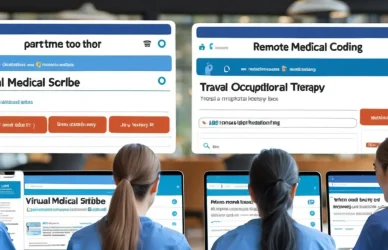Imagine combining your passion for occupational therapy with the excitement of discovering new cities, cultures, and healthcare systems while building your resume and earning competitive pay. Travel occupational therapy jobs offer medical students and new graduates a unique launching pad into the U.S. healthcare workforce. Whether you want to explore different clinical settings or seek flexibility early in your career, this path opens doors that can shape your professional journey.
What Are Travel Occupational Therapy Jobs?
What Are Travel Occupational Therapy Jobs?
What Are Travel Occupational Therapy Jobs?
What Are Travel Occupational Therapy Jobs?
What Are Travel Occupational Therapy Jobs?
Travel OT jobs are temporary assignments, usually lasting 8 to 13 weeks, in healthcare facilities across the country. These positions can be in hospitals, rehabilitation centers, schools, or outpatient clinics. They provide valuable healthcare jobs with built-in variety, perfect for those who want to stay adaptable and gain diverse experience.
Why This Path Appeals to Aspiring Medical Professionals
Why This Path Appeals to Aspiring Medical Professionals
Why This Path Appeals to Aspiring Medical Professionals
As a medical or allied health student, you are likely exploring different roles before committing to a long-term career path. A travel OT role blends direct patient care with the dynamic environment of a healthcare marketplace.
Additionally, you will witness firsthand how AI in healthcare is being integrated into patient tracking, assessment tools, and electronic medical records. This type of exposure can be beneficial if you later transition into healthcare administrator jobs, physician assistant jobs, or even technology-driven remote medical jobs.
The Pros of Travel OT Jobs
The Pros of Travel OT Jobs
The Pros of Travel OT Jobs
The Pros of Travel OT Jobs
The Pros of Travel OT Jobs
The Pros of Travel OT Jobs
Diverse Clinical Settings
Each assignment brings new challenges. You may work in a children’s hospital during one contract and a rural rehabilitation center during the next.Competitive Pay and Benefits
Travel therapists often receive housing stipends, travel reimbursements, and higher pay compared to staff roles.Improved Work-Life Balance
Because these positions are contract-based, you can plan breaks between assignments to rest, recharge, or study.Networking and Growth
Each job expands your professional network and may lead to long-term career opportunities.
The Cons and Challenges to Prepare For
The Cons and Challenges to Prepare For
The Cons and Challenges to Prepare For
The Cons and Challenges to Prepare For
Frequent Transitions
Adjusting to new facilities, staff, and patient populations every few months can be overwhelming.Licensing Across States
Occupational therapy licenses vary by state. Some states may require additional exams or paperwork.Housing and Logistics
Even with stipends, short-term housing can be difficult to secure.Burnout Risk
Constant change and heavy workloads may increase the risk of physical and mental fatigue.Visa Complexities
For international graduates, securing visa sponsorship healthcare jobs can be challenging.
Tips for Balancing Success and Self-Care
Tips for Balancing Success and Self-Care
Tips for Balancing Success and Self-Care
Tips for Balancing Success and Self-Care
Tips for Balancing Success and Self-Care
Tips for Balancing Success and Self-Care
Build a consistent routine, even during short contracts.
Pack light but include familiar items that make new housing feel like home.
Connect with professional networks and use Hubmed’s platform to stay engaged.
Take planned breaks between assignments to avoid burnout.
Why Hubmed Is Your Best Career Partner
Why Hubmed Is Your Best Career Partner
Why Hubmed Is Your Best Career Partner
Why Hubmed Is Your Best Career Partner
Why Hubmed Is Your Best Career Partner
Hubmed is more than a job board. It is a career partner that helps you navigate the evolving healthcare marketplace. Whether you are looking for entry level medical jobs in the USA, visa sponsorship healthcare jobs, or long-term career opportunities, Hubmed connects you with the right employers.
With advanced search filters, curated listings, and a focus on healthcare professionals, Hubmed makes your career search smoother and more strategic.
Conclusion
Conclusion
Conclusion
Conclusion
Conclusion
Travel occupational therapy jobs are an exciting option for medical students and new graduates who want to combine adventure with professional growth. While there are challenges such as licensing and logistics, the rewards include diverse experiences, competitive pay, and invaluable career development.






